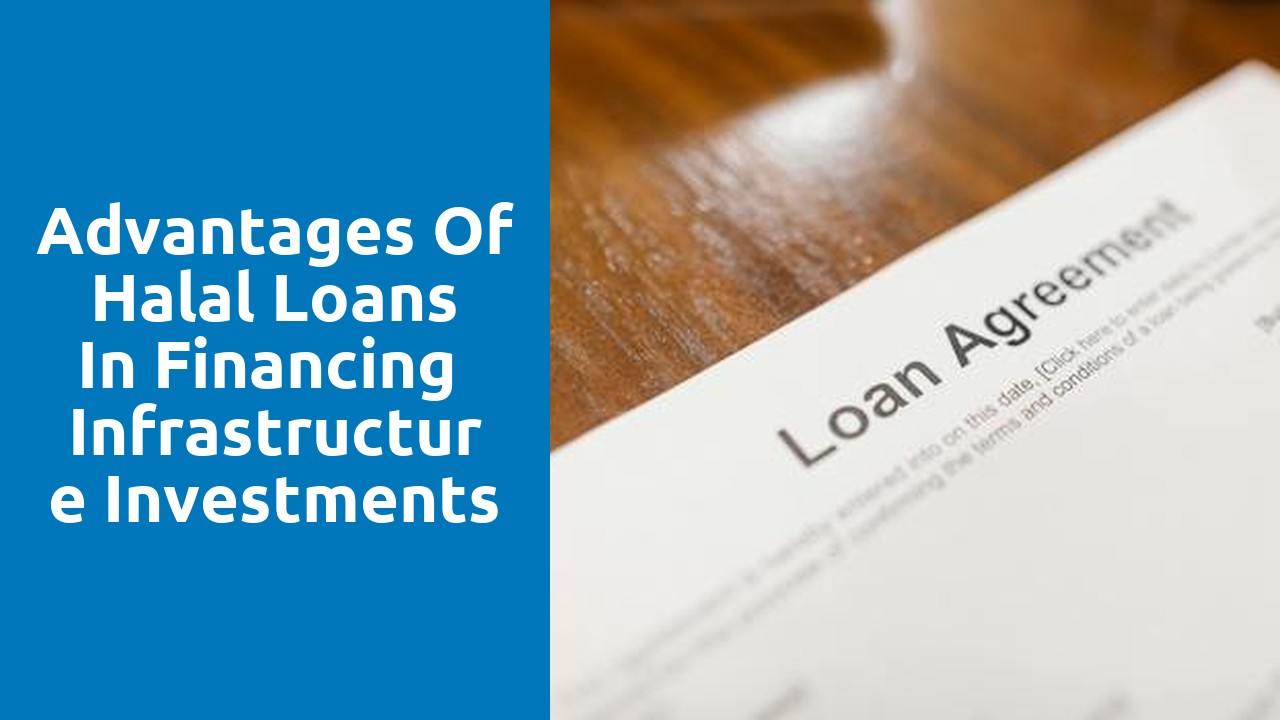Advantages of Halal Loans in Financing Infrastructure Investments

Table Of Contents
Building a Strong Foundation: How Halal Loans Support Infrastructure Investments
In today's increasingly interconnected world, infrastructure development plays a pivotal role in driving economic growth and fostering sustainable development. However, funding these large-scale projects often poses a significant challenge. This is where halal loans step in, providing a viable and ethical financing option for infrastructure investments.
Halal loans, in accordance with Islamic principles, offer a unique financing solution that aligns with the values and beliefs of Muslim investors. These loans prohibit the charging or paying of interest and promote risk-sharing, ensuring a more equitable framework for investment. By adhering to ethical principles, halal loans not only attract Muslim investors but also appeal to a broader range of socially conscious individuals and institutions looking to support infrastructure projects that uphold ethical and sustainable practices.
Empowering Economic Growth: The Role of Halal Financing in Infrastructure Development
Halal financing plays a crucial role in empowering economic growth through infrastructure development. With its adherence to Islamic principles, halal financing ensures that infrastructure projects are funded in a transparent and ethical manner. This not only attracts investors who prioritize ethical investments, but also fosters trust and confidence among stakeholders.
Moreover, halal financing provides a sustainable funding mechanism for infrastructure development. By adhering to Islamic principles such as prohibiting interest-based lending, halal loans promote equitable sharing of risks and rewards. This encourages long-term partnerships between investors and project developers, leading to the successful completion of infrastructure projects. Furthermore, the principles of halal financing also emphasize the importance of social welfare and environmental sustainability, ensuring that infrastructure projects benefit society as a whole and contribute to a more sustainable future.
Bridging the Gap: Halal Loans as Catalysts for Infrastructure Projects
Halal loans play a crucial role in bridging the gap when it comes to financing infrastructure projects. With the increasing demand for sustainable and ethical financing options, halal loans offer a viable solution that aligns with Islamic principles. These loans provide a means to fund infrastructure projects while adhering to strict Shariah guidelines, ensuring that financial transactions are conducted in a fair and ethical manner.
One key advantage of halal loans in bridging the gap for infrastructure projects is their flexibility. These loans can be tailored to suit the specific needs of the project, whether it is for building roads, bridges, or even renewable energy infrastructure. The flexibility of halal loans allows for a more efficient allocation of funds, ensuring that the infrastructure development needs are met effectively. By providing a funding solution that is both ethical and adaptable, halal loans act as catalysts in driving infrastructure development and bridging the gap between funding and execution.
Fueling Progress: How Halal Financing Drives Infrastructure Investments
Halal financing has emerged as a powerful driver for infrastructure investments, fueling progress and fostering economic growth. With its adherence to Islamic principles and ethical practices, halal financing offers a unique approach to funding infrastructure projects that aligns with the values and beliefs of many individuals and communities.
One of the key advantages of halal financing in driving infrastructure investments is its focus on sharing risk and promoting fairness. In Islamic finance, the concept of profit and loss sharing ensures that all stakeholders bear a portion of the risk, creating a more equitable distribution of rewards and preventing excessive financial burden on any particular party. This not only encourages responsible lending and borrowing practices, but also incentivizes long-term investments in infrastructure that can contribute to sustainable development and inclusive growth. By adhering to these principles, halal financing helps to build a strong foundation for infrastructure development, enabling progress and driving positive change in societies around the world.
Unlocking Potential: The Advantages of Halal Loans in Funding Infrastructure
Halal loans offer numerous advantages when it comes to funding infrastructure projects. Firstly, these loans adhere to Islamic principles, making them a viable option for Muslim individuals or institutions seeking financing for infrastructure development. The prohibition of interest, or riba, in Islamic finance ensures that the loans are structured in a way that avoids exploitation and promotes ethical practices. By aligning with Islamic principles, halal loans provide a transparent and responsible approach to financing, which can attract both Muslim and non-Muslim investors alike.
In addition, halal loans also promote inclusivity and social equity in infrastructure investments. Islamic finance principles emphasize the concept of risk-sharing, where the lender and borrower share the risk and reward of the project. This approach ensures that the burden of financing is not solely placed on the borrower, but is rather shared among all stakeholders involved. Consequently, this equitable distribution of risk can help foster a more inclusive and collaborative approach to infrastructure development, promoting sustainability and long-term economic growth.
Paving the Way for Sustainable Development: Halal Financing for Infrastructure Investments
Halal financing is gaining recognition as a viable solution for funding infrastructure investments, particularly in Islamic countries. With a focus on ethical financial practices, halal loans offer a unique opportunity to pave the way for sustainable development. By adhering to Sharia principles, halal financing ensures that investments in infrastructure align with moral and ethical standards, promoting economic growth while preserving societal and environmental values.
One of the key advantages of halal loans in funding infrastructure projects is their ability to attract a broader range of investors. With the global halal market reaching trillions of dollars, there is a significant pool of potential investors who seek ethical and sustainable investment opportunities. By offering halal financing options, infrastructure projects can tap into this vast market, opening doors to new sources of funding and accelerating development. This not only diversifies the funding base but also creates opportunities for collaboration and partnerships, driving innovation and efficiency in the delivery of infrastructure projects.
Related Links
Case Studies: Successful Infrastructure Projects Funded by Halal LoansHow Halal Loans Contribute to the Growth of Sustainable Infrastructure Projects